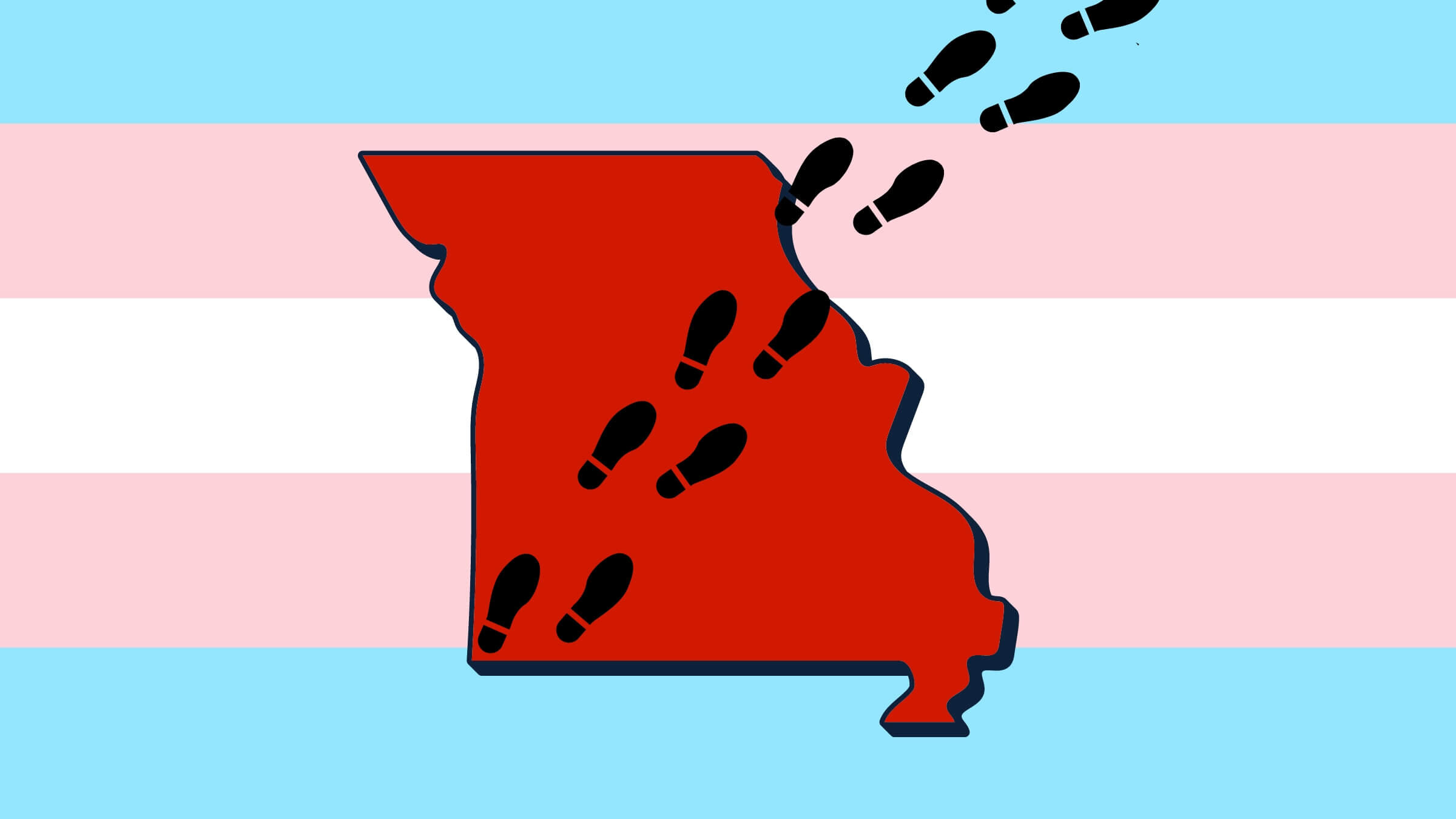My family fled persecution as Jews in Egypt. 70 years later, I may have to leave my home because I’m trans
I’m a trans rabbi in Missouri, where gender-affirming healthcare is now largely illegal

Graphic by Matthew Litman
It was 2 a.m. again, and I could not get off the computer. I scrolled through real estate listings and lists of Jewish communities around the country with day schools and welcoming synagogues, trying to imagine where my family and I could go.
I am a transgender rabbi in Missouri, and had been watching my most basic civil rights fall like dominoes. Through the past three legislative sessions, the trans community (and the broader LGBTQ+ community) in Missouri has seen bill after bill targeting us and our children in terrifying ways. This year, some of the most painful proposed bills — banning access to gender-affirming healthcare for many transgender Missourians and banning transgender youth from playing sports — have been signed into law.
I feel shaken to my core.
Through the past weeks and months, I have been on the phone with friends and family members who are scared. With doctors and nurses trying to secure care for their patients before new laws take effect. With leaders who are heartbroken to see community members and students in such pain and who do not know how to help. The count of friends and loved ones making the decision to leave grows by the week.
I can’t help thinking that it is not supposed to be this way. The gains that our LGBTQ+ elders and ancestors worked for are a precious gift, and the work that we continue to do is meant to bring us a world that is safer and more joyful than the world we inherited. But today, critical progress is being erased.
I came out as transgender in Missouri in 2014, shortly after my ordination as a rabbi. I was unsure of what my home and my community — or my job — would have in store for me as an openly queer and transgender rabbi working in the Jewish world. My fears subsided when I was immediately welcomed. I could walk into any synagogue and see not only friendly faces, but also other queer and trans members.
I never thought that nine years later, I would be up at night wondering if I can safely continue to live here.
As Missouri officially joined seven other states in banning gender-affirming care for minors and some adults as of June 7, and 19 other states with discriminatory laws targeting trans people, the loss that transgender Missourians are experiencing is too devastating to quite put into words. Gender-affirming healthcare is lifesaving for those of us who need it, and losing access to this care is not tenable. Transgender youth are most directly targeted by these bans, despite broad consensus among medical providers that this care is medically necessary for many youth. Already, people are relocating to states where they and their children can live more safely.
My Jewish community is losing leaders and members by the week. I don’t think that my local daily minyan will have the membership to continue to meet regularly. And if I decide to stay, the trans community that has held me for the last decade will no longer be here to support me.
It’s deeply frightening and personal. Every trans person I know is asking themselves the same questions that I am: Should I leave now? If not now, when? And how will I know?
I keep thinking about my mother and her parents who, as persecuted Jews, fled Egypt in the 1950s. I remember my grandmother Juliette telling me about the nights they spent by the radio, listening to the news and deciding when, or whether, to flee.
She spoke about seeing her friends and family leave one by one and weighing each new instance of hostility toward Jews. She talked through the gut-wrenching decision to ultimately leave behind her beloved Jewish community in Cairo, and the profound grief in seeing that ancient community dissolve. My mother, who was very young when they fled Egypt, rarely spoke of the experience. Yet for the rest of her life, despite safely living in the United States, she kept a packet of the most essential items ready in case she ever had to leave again: her passport, three kinds of currency, medications and a few gold bangles.
I never thought that my family’s experience of persecution and exile would be my reality. And yet, here I am, choosing to stay for now but knowing that I need to keep one hand on the door.
In 2014 when I came out as trans, I was nervous about what beginning my gender transition in Missouri would mean — would I find providers who knew how to manage transition-related care? Would I be able to jump through the hoops of “proving” my gender identity in order to access the care I had so urgently needed for years? Would I ever be able to live in a body that felt like home?
Ultimately, the experience was quite manageable. There were fewer providers of gender-affirming care at the time, yet many were eager to learn and actively expanded their practices to serve trans and nonbinary clients. While not easy, I was able to access the care that I needed, and doing so brought me more peace and joy than I could have hoped for.
Within my Jewish community, too, I found myself embraced and cared for. Colleagues and friends responded to my transition with celebration. My employment remained secure, and I was able to bring more of myself to my work as a rabbi. I found my Jewishness deepened by my transness, and my transness sweetened by my Jewishness. I saw young trans people in my community with more possibility models and felt grateful that they, unlike me, would grow up knowing that being trans was something not only possible, but ordinary.
As Keshet’s director of education and training, I support Jewish institutions to live their values and create spaces of belonging for LGBTQ+ individuals and families. When the anti-trans legislation was initially proposed in Missouri, I worried that the same work that I find energizing would become draining, but it has been the opposite. Instead, I am reminded daily why I do this work: Spaces of belonging for people like me are needed now more than ever.
It is precisely at this moment that I call on the Jewish community to take action. We need you.
If you are in a state where LGBTQ+ rights are at risk, contact your legislators to urge them to support LGBTQ+ rights. Invite your synagogue, community or Jewish institution to participate in Thrive: The Jewish Coalition to Defend Trans and LGBQ+ Youth to stay up to date on action you can take. If you have trans members of your community who are being forced to flee this dangerous legislation, consider what material support you can provide.
If you are in a state where LGBTQ+ rights are relatively secure, talk with your network about what you can do to support LGBTQ+ people in other states, including newcomers to your community.
The Torah demands of us: “You must not stand idly by” (Vayikra 19:16). If we witness harm, we are compelled to protect one another. Against a backdrop of legislation that endangers the safety and well-being of millions of LGBTQ+ people, each of us has an obligation to act.
The news is overwhelming and relentless. But we know the truth: Queer and trans people have always been here and will always be here. We are your friends, family and neighbors.
We are fighting and we need you to join us.
To contact the author, email [email protected].
















